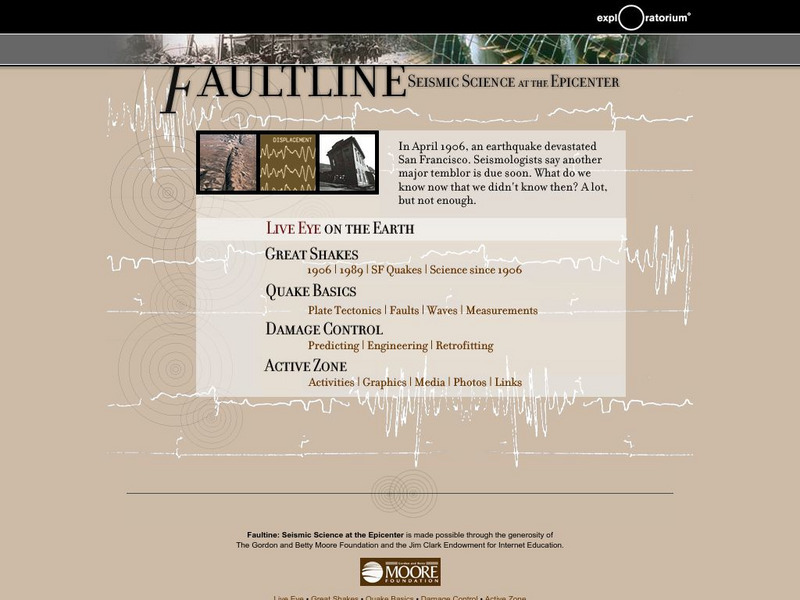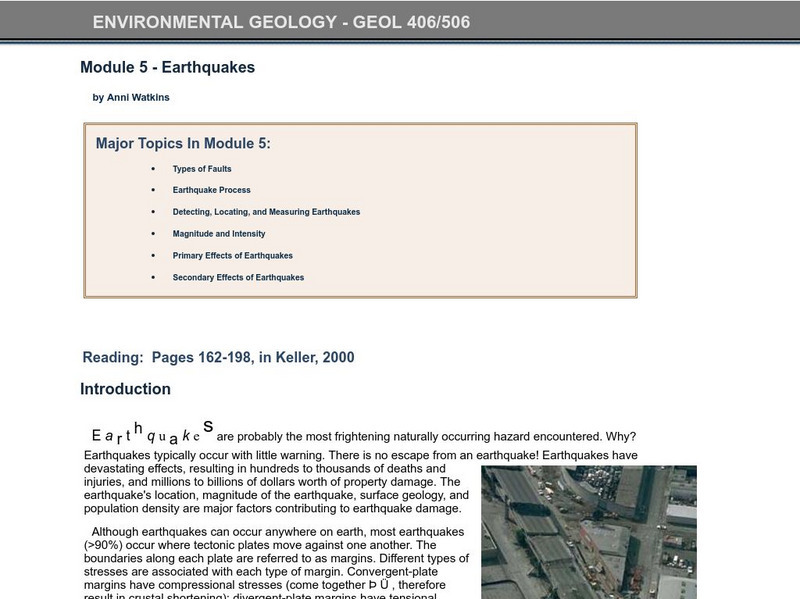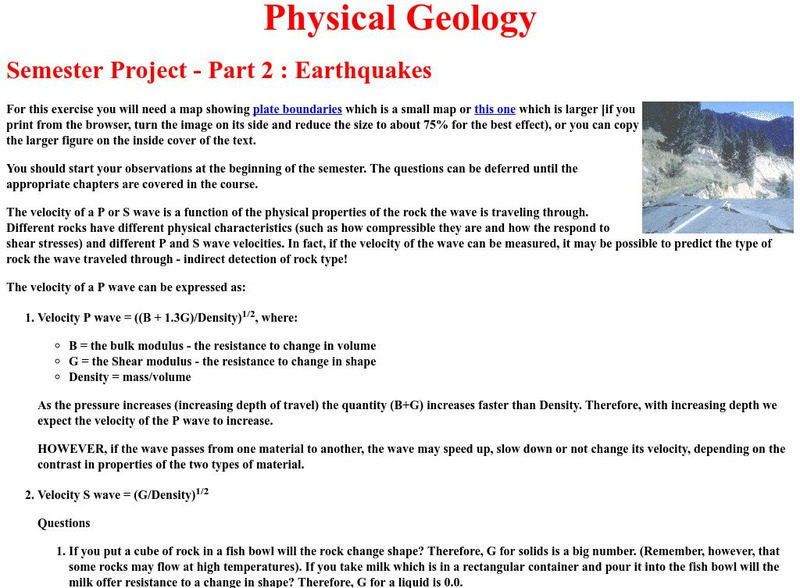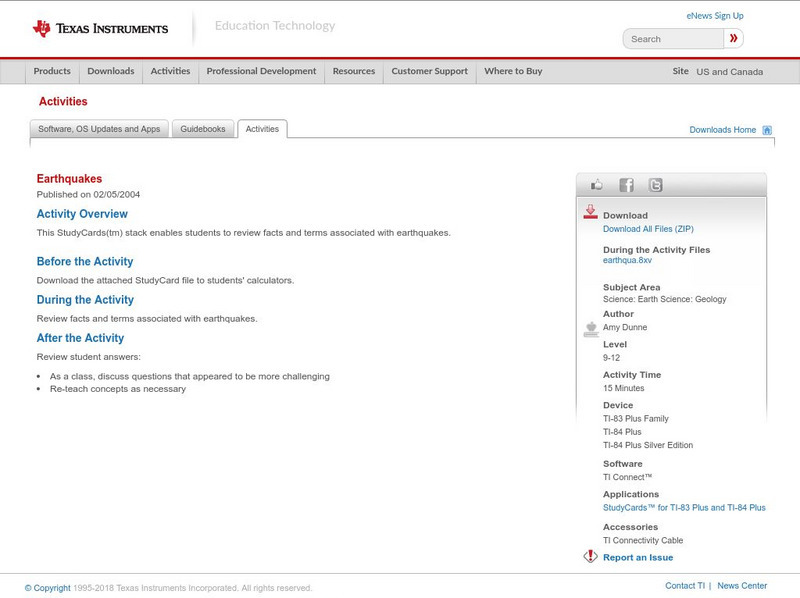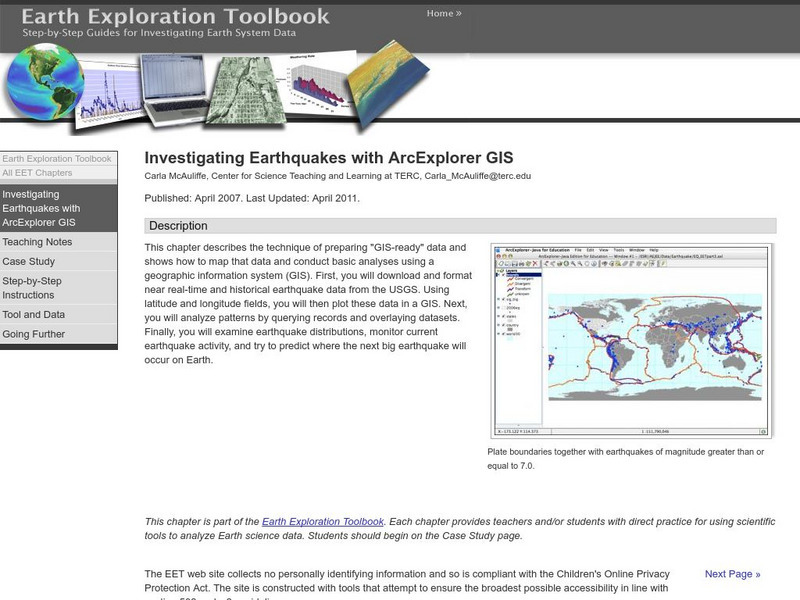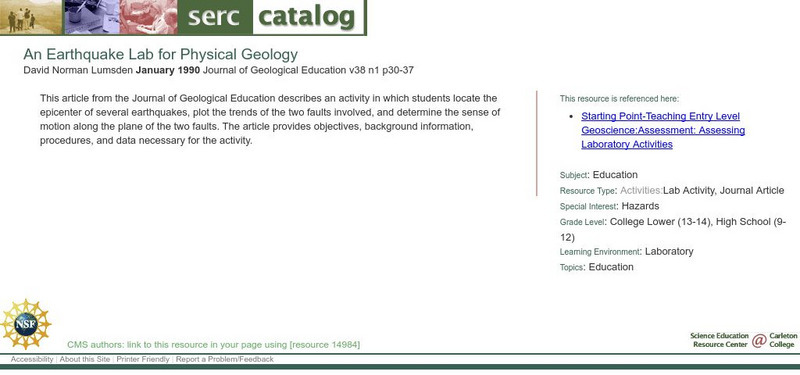Hi, what do you want to do?
Other
New Madrid: Earthquakes of 1811 1812
This very detailed description of the largest series of earthquakes in the United States tells what happened to the land and rivers as a result of the quakes. Read about the series of earthquakes that shook the region between December...
Smithsonian Institution
National Museum of Natural History: Global Volcanism Program: This Dynamic Planet
Interactive activity that allows the learner to make their own regional map using layers of their choice such as volcanoes, craters, plate tectonics, or earthquakes. This map of the Earth zooms in and out, highlights essential processes,...
PBS
Pbs Learning Media: Mechanical Waves: Interactive Lesson
Learn about mechanical waves, which transfers energy from one place to another through liquids, gases and solids, with this interactive lesson.
The Washington Post
Washington Post: Mapping America's Wicked Weather and Deadly Disasters
Features data collection for natural disasters and maps the trends giving us an idea of where disasters have a tendency to strike.
Concord Consortium
Concord Consortium: Seismic Explorer
Explore the pattern of earthquakes on Earth, including magnitude, depth, location, and frequency.
PBS
Pbs: Earth Science Exploration
An earth science collection where students can explore earthquakes, volcanoes, and more natural phenomena. The collection uses videos and interactive activities to investigate our dynamic planet and earth systems.
Exploratorium
Exploratorium: Faultline
This site includes all things shaky--earthquakes that is. Observe real-time data regarding seismic activity all over the world. Other modules include information about history's great quakes, earthquake basics and how to recover from...
Cengage Learning
Geology Link
A geology news site that is updated daily with news on the latest geological happenings, such as earthquakes. It also has virtual field trips and a glossary of geology terms.
Extreme Science
Extreme Science
Explore the science behind the "extremes" in our world. Organized into sections on earth science, the animal kingdom, technology, and space science, this site opens your eyes to giant creatures, amazing technological advances, vast...
Burke Museum
Burke Museum: Earthquake Science
This section of the Burke Museum's online exhibit on earthquakes and natural disasters focuses on the science of earthquakes. Topics that are covered include plate motion, heat, interior of the earth, and more.
Burke Museum
Burke Museum: Earthquake Preparedness
Part of the Burke Museum's online exhibition titled "The Big One" which focuses on earthquakes and quake science, this site looks at safety precautions to take when dealing with earthquakes.
Idaho State University
Idaho State University: Environmental Geology: Earthquakes
Study earthquakes from the earth's faults to the measurement system used in researching the shakers. Investigate what the primary and secondary effects are.
PBS
Pbs Learning Media: Tectonic Plate Movement in Alaska
In this video adapted from KUAC-TV and the Geophysical Institute at the University of Alaska, Fairbanks, learn how tectonic plate movement is responsible for building mountains, such as the Wrangell and St. Elias Mountains. 2m 16s
University of Houston
University of Houston: Earthquakes
This exercise will help learners understand the plate boundaries of earthquakes.
Province of British Columbia
B.c. Ministry of Energy, Mines and Petroleum Resources: Earthquakes in b.c.
Offers information on how earthquakes are created and why they hit British Columbia as hard as they do.
University of California
Earthguide: Mystery Detectives: Mystery Epicenter: Earthquake
Students analyze seismograms to locate mystery earthquake epicenters as they produce a news story about a major local earthquake to complete their mission.
Texas Instruments
Texas Instruments: Earthquakes
This StudyCards stack enables students to review facts and terms associated with earthquakes.
Science Buddies
Science Buddies:testing Compression Waves
Here's a project for studying compression waves in different soil types. It uses a homemade wave tank for solids, with a frequency generator, amplifier, and loudspeaker as the vibration source. There are lots of interesting possibilities...
Science Education Resource Center at Carleton College
Serc: Getting to the Point: Exploring Tectonic Motion Point Reyes Seashore
The intent of this module is for learners to make straightforward numerical calculations as they learn about earthquake geology at a National Park.
Science Education Resource Center at Carleton College
Serc: Investigating Earthquakes With Arc Explorer Gis
This activity allows young scholars to predict future earthquake activity by interpreting the results of geographic information system (GIS) analysis.
Science Education Resource Center at Carleton College
Serc: Bot Ec: Energy Released in an Earthquake
A magnitude 8.5 earthquake (such as the 1964 Good Friday earthquake in Alaska) releases about 1x1018 joules of energy. The atomic bomb exploded over Hiroshima released about 1.5x1013 joules of energy. How many Hiroshima bombs would one...
Science Education Resource Center at Carleton College
Serc: Bot Ec: The San Andreas Fault's Rate of Movement
The San Andrea is an active fault zone, marked by frequent earthquake activity. The crust southwest of this strike-slip fault (including Los Angeles) is sliding to the northwest relative to the other side. It is possible to estimate the...
Science Education Resource Center at Carleton College
Serc: An Earthquake Lab for Physical Geology
This article from the Journal of Geological Education describes an activity in which students locate the epicenter of several earthquakes, plot the trends of the two faults involved, and determine the sense of motion along the plane of...
Science Education Resource Center at Carleton College
Serc: Fairly Simple Geology Exercises
A collection of geology exercises which include relevant background information, complete instructions, student handouts, and answer keys. Topics include rock and mineral identification, Bowen's reaction series, crystal models,...







